Noel Pearson says October 14 offers a choice: cross the bridge to our future or flounder in past
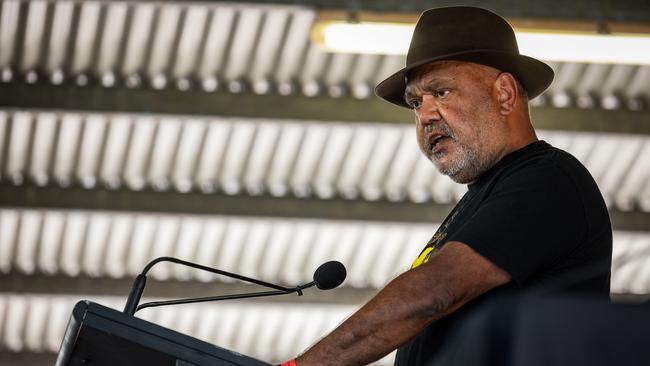
My speech is titled For the Love of Country. I mean not love in a saccharine or sentimental way, nor romantic or patriotic love. I mean in the sense the late English philosopher Roger Scruton called Oikophilia: Oikos, the Greek for home, and philia for love – the love of home. I have been on the road of this campaign meeting tens and thousands of Australians in forums, around baggage carousels, at the train stations and shopping malls, town halls and shade of mango trees – and the hours, days and weeks are an emotional and pictorial kaleidoscope flashing through my mind’s eye. In the quiet after the noise and bustle I’ve reflected on what I have learned from listening to thousands of my fellow Australians, and the thousands whose intentions in this referendum I could not be sure of. I’ve conversed about constitutional law, politics, race, details, equality, discrimination, fears and hopes – and I have endeavoured to answer questions honestly and accurately.
Beyond these details I have come to see it is the love of our country that joins us all as Australians. I said it’s not the same as patriotism because there is nothing political about this love of country. Rather it is about the wondrous lands and seas – all of the nature that makes this country so beloved of us all – and its effect upon our souls. No Australian can fail to feel this in the presence of Uluru. And a million other places each of us call our special homes.
I say today: it is the love of country that is our driving motivation for the recognition of Aboriginal and Torres Strait Islander Peoples in the Australian Constitution.
It is not love of each other that joins us, it is our mutual love of country that unites us. We don’t need mutual affection to succeed in this referendum. We need to recognise our mutually shared love for this country. Our children and great children will be more likely to share affection between them than us – because too many of us have grown up strangers – but when you bring your children to come to know our children, they will each be the better for it. That is the promise of the future.
So let me turn to love and the strongest motive for voting Yes.
Words can explain. Let’s keep having conversations about “Constitutional recognition of Aboriginal and Torres Strait Islander Peoples as the First Peoples of Australia” in the remaining time we have.
Law can assure us. This referendum will uphold the Constitution and recognise Aboriginal and Torres Strait Islanders as the First Peoples of Australia. This amendment is constitutionally safe and will adorn our founding law.
Philosophy can give us reasons. It is not inequality to recognise Aboriginal and Torres Strait Islanders were the owners of Australia since time immemorial. It is simply the truth.
Friendship can increase empathy. We are 3 per cent and you 97. It’s understandable we mostly don’t know each other as friends. If we shared meals, we could rely on the empathy of friendship. Empathy is so important.
But only love can move us now.
Not the love of family. Unlike other campaigns we don’t have the love of family to join hearts with heads.
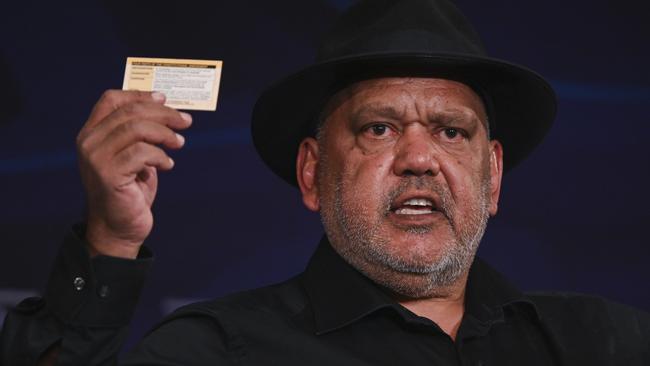
Not the love of familiarity. Only few are familiar with us. That’s no fault of anyone, it’s just we are so few and you so many. Australians mostly do not know our cultures, our languages, the things that make us the same as you, and the things that make us so unfamiliar even after two centuries. We are not yet like our New Zealand friends who have brought the cultures of the Māori and the Pakeha together.
Not the love of experience. Apart from sport, school and work, we don’t have enough shared stories of loyalty, friendship and mateship. What mateship there was between our Diggers in the world wars is not much known and remained unacknowledged after our people’s service.
Not the love of admiration. Australians have always admired our sporting and cultural heroes, and little wonder we are proud of their ability to enjoin your respect. But admiration is not what I am talking about here.
It is the love of country. This is a civic love. It is the basis of a shared fealty to this land. It is for the love of country that the Australian People cohere under the first-person plural: We. It is the largest motive we have for voting Yes.
It’s the love of home. Our Australian home is the source of this love. Ownership is lower in order, concerning law, title and real estate – whereas our larger responsibility – shared by all of us – is the custody of our national home. Our responsibility as custodians on behalf of Our Future Unborn is our highest duty and an expression of this love of home.
It is the great love we share.
Always was. This is the voice of reminder of the ancient origin of this love.
Always will be. This is the voice of moral protest and insistence: that this is still a home of ancient origin and continuing truth.
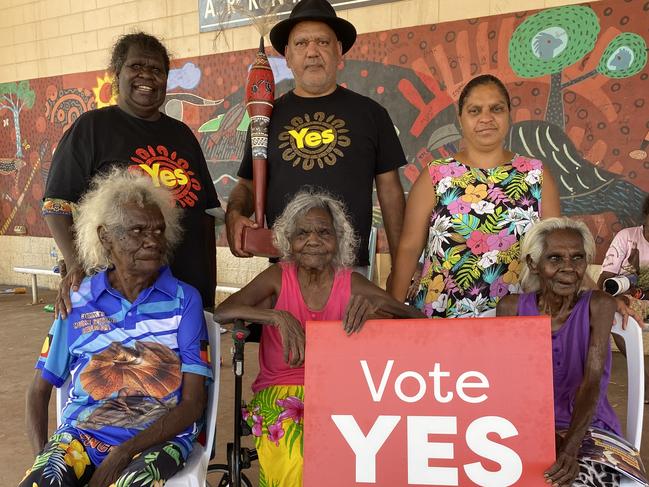
Mine, Yours, Ours. This is the North Shore to which we are building a bridge of unity and mutual recognition. We can move from protest and reminder to mutual recognition. I want for our national prayer to be: This land is my land. This land is your land. This land is our land.
My people are good people. They’ve done nothing to deserve contempt and disdain. They should not be feared or despised. They have suffered much, let’s not prolong their alienation. They have much to contribute to their country if only they be given the chance to.
This is a modest proposal but profound. An advisory body in the Constitution to which the parliament and government will listen to Aboriginal and Torres Strait Islander peoples so we get better results for Indigenous people and for Australia.
Its profundity is based on a simple truth. When we listen to each other outcomes are improved. I have learned the hard way, over a lifetime of community work, day after day, year after year, decade after decade, that Listening makes it Possible. Listening isn’t all, but it is a precondition for success.
My work has taught me the power of listening. Over decades of community work in law and order, welfare reform, school education, employment, economic development and cultural protection, I have observed both the fundamental power of listening, and the devastating consequences of wilful deafness.
I have learned that listening makes it possible.
Rheumatic heart disease is a scourge, a disease largely eradicated in the rest of the world, but allowed to fester in the paradise of Cape York and the remote communities of Australia.
At an event yesterday in Brisbane, doctors confirmed this terrible disease kills two Aboriginal and Torres Straight Islander people per week. Young children, teenagers, and young adults in their 20s and 30s. They drop dead swimming down the creek, on the football field, sleeping in their beds at night.
Yet when I searched Hansard I found the local federal Member of parliament, ensconced in his safe seat for 26 years, never found time to mention rheumatic heart disease in our nation’s chamber of democracy even once. He did for the first time when I mentioned this shameful failure in this campaign.
This is a problem only a voice can overcome. To ensure people who represent us, who make laws about us, who determine so much of the reality of our lives, listen to our advice, and have the opportunity to benefit from the power of our ideas.
Rheumatic heart disease inflicts lifelong damage to the valves around a child’s heart, causing early death. But it’s the lifelong damage to the ears of our nation’s decision-makers that has allowed this disease to prowl around Cape York decades after it has been eradicated everywhere else in mainstream Australia and around the world.
It is a disease of the unlistened to. It is the disease of a people who have spoken, but have not been heard.
No gets us nowhere when it comes to confronting rheumatic heart disease. Yes makes it possible.
That’s why your answer is so important to us. We would be untruthful if we didn’t say we have a mixture of hope and terror about the answer to this referendum. No-one wants their invitation of friendship and love to be unrequited. One may sometimes feel it would have been easier to have never extended the hand of invitation From the Heart. But whether out of naivete or faith, we had to ask Uluru’s invitation: will you walk with us on this journey to a better future?
It is time to take our rightful place in our own land. Our 21st prime minister, Mr (Gough) Whitlam, said that as a nation we remain diminished as long as we fail to recognise the rightful place of Aboriginal and Torres Strait Islanders in our own country. Let’s do this now. The opportunity to get this right is now at hand, right in front of us.
We have many problems. But we Australians have the gumption and we can summon the national resolve to get on top of them. We can close the gap when we are empowered to take responsibility for our destiny. Blame us when you give us a voice. Hold us accountable too when we do this. We want our right to take responsibility. Allow us to empower our people to take charge of our destiny. Our children, our families, our people.
We have many talents and gifts to contribute. More than half the solution to solving problems is to unleash the talents and gifts of our people. Our task is for the potential of people – especially our youth – to be realised in their fullest measure.
We would like Australia to be kinder and friendlier to our children. Let’s follow Dr (Martin Luther) King’s dream that our children will embrace each other as brothers and sisters, in a way that too much eluded us in our own time.
Our children will walk in two worlds. And enjoy the best of both.
Their culture will be a gift to their country. And they will join the mainframe of Australia, free to be modern versions of themselves.
This gift of Indigenous culture – from old Australia to new – is the peace dividend of the middle way.
Because if we vote Yes, we are voting Yes to orientate the relationship between Indigenous and non-Indigenous Australians down a safe and responsible middle path.
Voting Yes is a rejection of war. Voting Yes crosses the bridge on the pathway to peace.
Voting No is not a neutral choice. Voting No is an active choice to take us nowhere.
Voting No leaves us suspended in the neverland that exists when two peoples love the same homeland, but have not yet learned to love each other.
There is no peace dividend if we vote No, there is only the continued acrimony of endless debate, the harsh penalty of division paid in shame, and mutual suspicion.
It is only by voting Yes that we choose a responsible middle path for our national story, a story that accords Indigenous Australians a rightful place in our own home.
If we choose this middle path, and complete the journey to a new settlement, the peace dividend of cultural exchange, will be payable, and will be paid.
We the Australian people are good people. At our best we can be a beacon of light to the world. It is this humble temperament and quiet capacity for greatness that gives me faith we will vote Yes.
Recognition runs two ways. Think about it as a mirror into which we see our own reflection in each other. This Referendum is the largest mirror we will ever look into as a nation. Twenty-seven million people will look into this mirror on 14 October and see ourselves like we never have before.
Recognition is about the 97 per cent recognising the 3 per cent and offering the gift of Australia’s 122-year-old constitutional democracy.
Recognition is about the 3 per cent recognising the 97 per cent and offering the gift of Australia’s millennia-old heritage.
The first is about democratic participation.
The second about identity. And, dare I say, the spirit of Australia.
When he spoke the truth of our history at Redfern our 24th prime minister, Mr (Paul) Keating, said it was not about guilt.
It was about opening our hearts.
You are not guilty for the past. Neither are we. Our alleged inferiority is no justification for that history. Not then, not now. The inhumanity of the frontiers was not because we were inhuman.
We can only be responsible for forgetting the truth and its legacy in the present.
We were victims of history but our victimhood ends with our empowerment. Have the same high expectations of us as you would your own.
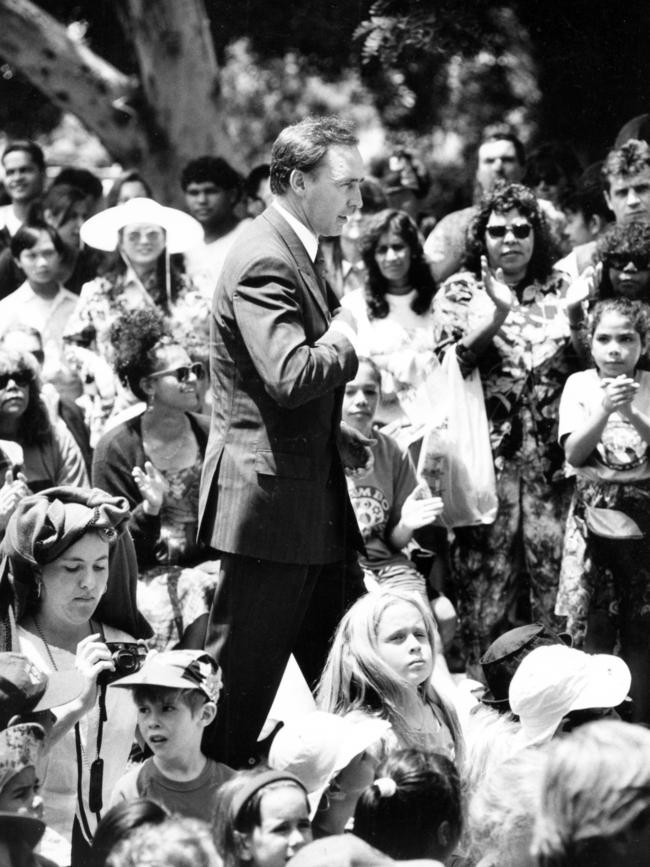
This referendum is testing the idea that a nation conceived in the fiction of terra nullius – a continent empty of owners – can come to a new understanding of who we are:
A nation blessed – with an Indigenous heritage spanning 60 millennia – a British democracy captured in its Constitution – and a multicultural unity that is a beacon to the world.
The referendum words complete the three parts of what our 25th prime minister, Mr (John) Howard, called “the profound, unfolding and compelling story of Australia”.
If affirmed, this referendum will seize our first best chance and last best hope for a lasting settlement.
We do this for our future unborn. For the countless generations to come, we – their grandparents and great-parents – bequeath them the settlement of future peace rather than the endless trouble of our colonial past. For now we can draw a line on the colonial past because we choose to make it our history rather than our legacy. Why would we the Australian people bequeath to our great children the irresponsible rhetoric of war and disunity? When we could give them reconciliation and justice instead?
On October 14 we the Australian people face a choice: a choice between crossing the bridge to our future or floundering in the past.
A choice between listening to each other, respecting each other, or closing our hearts and minds to the simple truth that when we listen, we get better results.
A choice between a safe and responsible middle path, or the failed dichotomy of assimilation versus separatism.
A choice between a country big enough for all of us to love, and just enough for all of us to flourish, or a country belittled by our differences, and demeaned by our past.
On October 14 we get a chance to begin a new chapter of Australian history, to bequeath our children the future they want, not the past that burdens us.
On October 14 we whisper into the wind of time that No gets us nowhere, and yes makes its possible.
On October 14 we can carve our generation’s name into the bedrock of history.
And for as long as there is history in this land, it will be recorded: we were asked, and we proudly voted Yes.
We can do this for the love of country. The love of Australia. My land. Your land. Our land.
Noel Pearson delivered this speech at the National Press Club in Canberra on Wednesday.


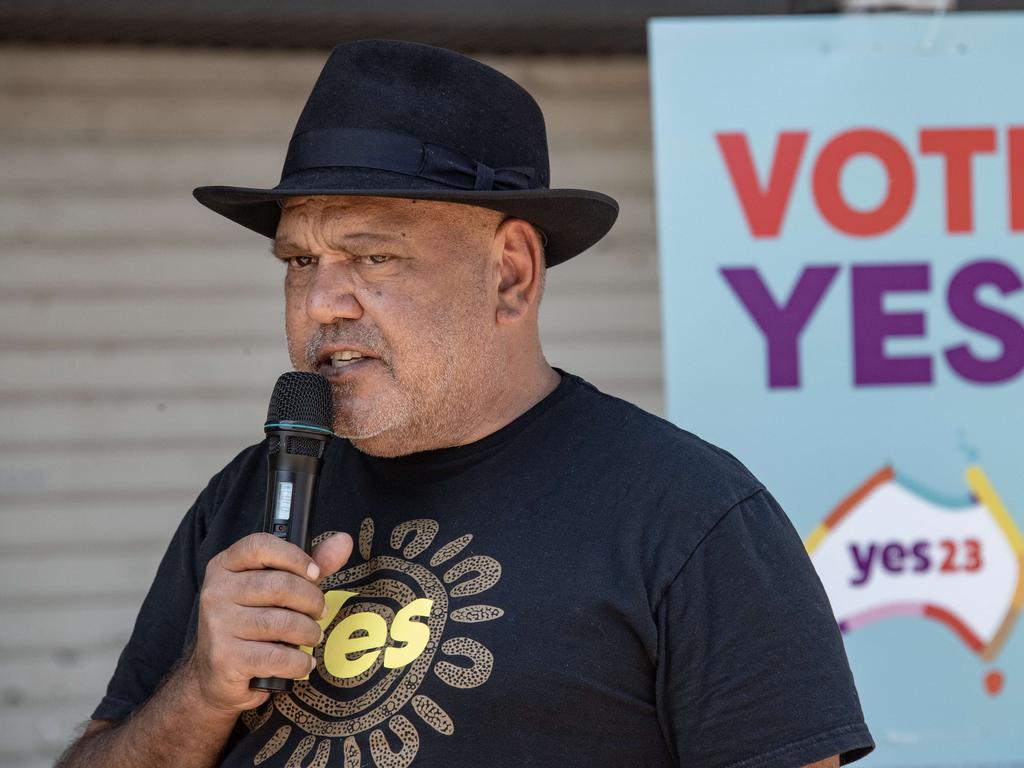
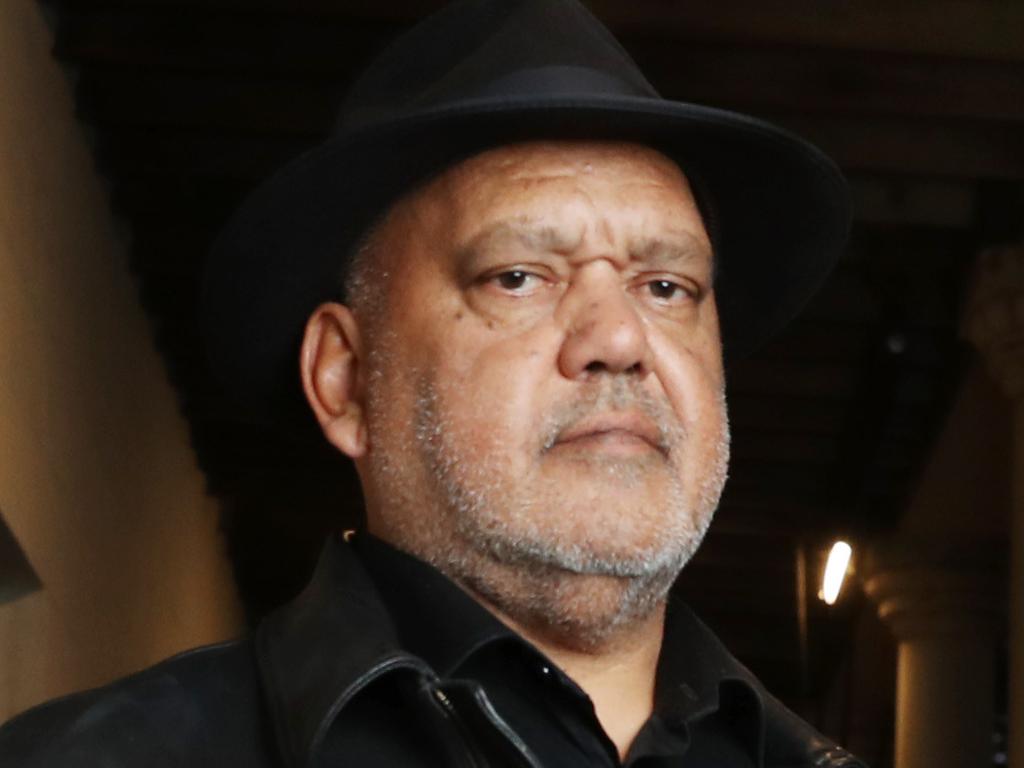
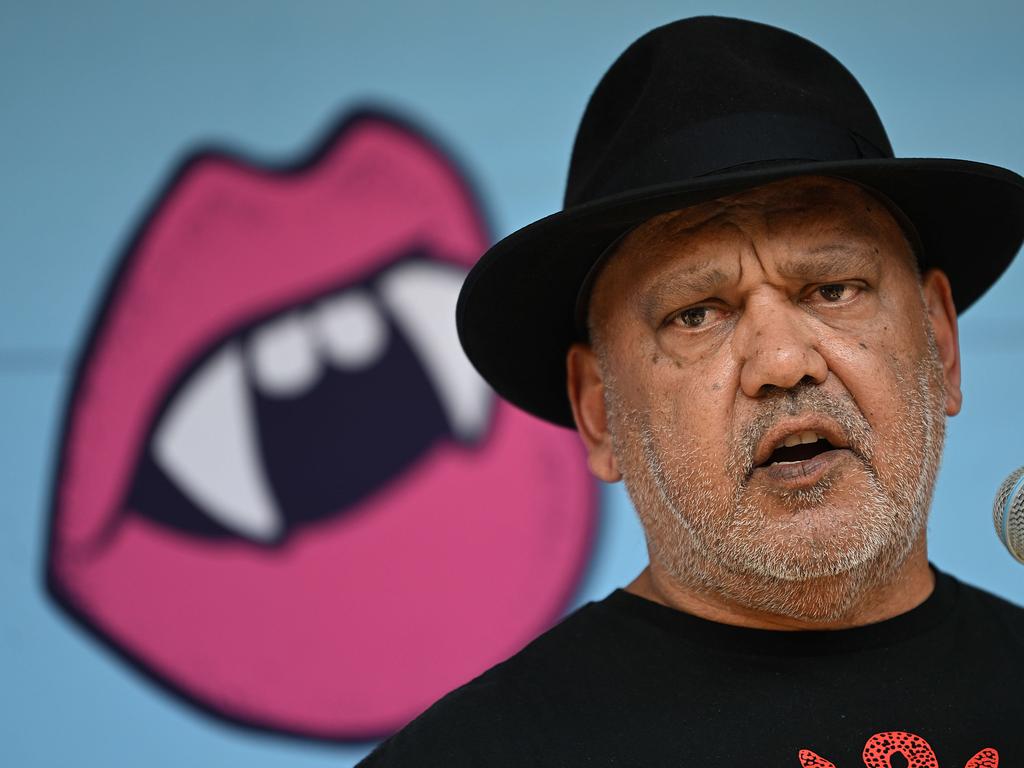


With the referendum not long now, I want to talk with you, my fellow Australians, about the largest motive for voting Yes, and why a voice is so important for Indigenous Australians.